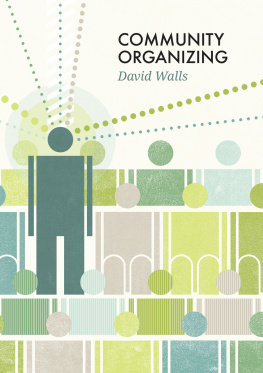SAUL D. ALINSKY
Reveille for Radicals
Let them call me rebel and welcome, I feel no concern from it; but I should suffer the misery of devils, were I to make a whore of my soul... Thomas Paine
University of Chicago Press Chicago, Illinois
University of Chicago Press Chicago 37 Agent: Cambridge University Press London
Copyright 1946 by The University of Chicago. All rights reserved. Published 1945. Composed and Printed by The Gallery Press, New York.
To Helene.
CONTENTS
PART I |
Call Me Rebel |
| What Is a Radical?.......... | |
| Where Is the Radical Today?...... | |
| The Crisis............. | |
PART II |
The Building of Peoples Organizations |
| |
| Native Leadership........... | |
| Community Traditions and Organizations .. | |
| Organizational Tactics......... | |
| Conflict Tactics........... | |
| |
| Psychological Observations on Mass Organi- |
|
| |
By-Laws of the Peoples Organization..... | |
PART I Call Me Rebel
CHAPTER 1 What Is a Radical?
The people of America live everywhere from Back Bay Boston to the Bottoms of Kansas City. From swank Highland Park, Illinois, to slum Harlem, New York. From the gentlemen farmers of Connecticut to the share-croppers of Arkansas. From the marble swimming pools of magnificent Bel-Air, California, to the muck of the Flats of Cleveland. From sooty Harlan County, Kentucky, to impeccable Bar Harbor, Maine.
The people of America are Red, White, Black, Yellow, and all the shades in between. Their eyes are blue, black, and brown, and all the shades in between. Their hair is straight, curly, kinky, and most of it in between. They are tall and short, slim and fat, athletic and anaemic, and most of them in between. They are the different peoples of the world becoming more and more the in between. They are a people creating a new bridge of mankind in between the past of narrow nationalistic chauvinism and the horizon of a new mankinda people of the world. Their face is the face of the future.
The people of America include followers of all the major religions on the face of the earth. They are Christians, regardless of which one of the two hundred or more different major varieties or sects that compose Christianity. They are Baptists, both Northern and Southern, Episcopalians, Lutherans, Catholics, Mennon-the-cob and Wienerschnitzel. They drink Coca-Cola and Pilsu beer.
They have fried chicken and hot biscuits at their church socials and chicken a la Stork Club at sophisticated night spots. They eat baked beans at the Automat and venison in the Wedgwood Room of the Waldorf. They are vegetarians, food faddists, and vitamin takers. They eat what their forefathers ate and their forefathers came from everywhere. The diet of America is the diet of the world.
The American people were, in the beginning, Revolutionaries and Tories. The American people ever since have been Revolutionaries and Tories. They have been Revolutionaries and Tories regardless of the labels of the past and present. Regardless of whether they were Federalists, Democrat-Republicans, Whigs, Know-Nothings, Free Soilers, Unionists or Confederates, Populists, Republicans, Democrats, Socialists, Communists or Progressives. They have been and are profiteers and patriots. They have been and are Conservatives, Liberals, and Radicals.
The clash of Radicals, Conservatives, and Liberals which makes up Americas political history opens the door to the most fundamental question of what is America? How do the people of America feel? It is in this feeling that the real story of America is written. There were and are a number of Americansfew, to be surefilled with deep feeling for people. They know that people are the stuff that makes up the dream of democracy. These few were and are the American Radicals and the only way that we can understand the American Radical is to understand what we mean by this feeling for and with people. Psychiatrists, psychologists, sociologists and other learned students call this feeling identification and have elaborate and complicated explanations about what it means. For our purposes it boils down to the simple question, How do you feel about people?
Do you like people? Most people claim that they like people with, of course, a few exceptions. When the exceptions art added together it becomes clear that they include a vast majority of the people. It becomes equally clear that most people like just a few people, their kind of people, and either do not actively care for or actively dislike most of the other people.
You are white, native-born and Protestant. Do you like people? You like your family, your friends, some of your business associates (not too many of them) and some of your neighbors. Do you like Catholics, Irish, Italians, Jews, Poles, Mexicans, Negroes, and Chinese? Do you regard them with the warm feeling of fellow human beings or with a cold contempt symbolized in Papists, Micks, Wops, Kikes, Hunkies, Greasers, Niggers, and Chinks? If you are one of those who think of people in these derogatory terms, then you dont like people.
You may object to this and say that you do not fall into this classification. You dont call people by such names. You are broad-minded and respect other peoples if they keep in their place and that place is not close to your own affections. You feel that you are really very tolerant. The chances are that you are an excellent representative of the great American class of Mr. But. Havent you met Mr. But? Sure, you have. You have met him downtown at civic luncheons. You have met him at Community Fund meetings, at housing conferences, at political rallies, and most likely he has greeted you every morning from the mirror in your bathroom. Mr. But is the man who is broadminded, sensibly practical, and proud of his Christianity. You have heard him talk many times, just as you have heard yourself talk many times. What does he say? Listen to the great American, Mr. But:
Now nobody can say that Im not a friend of the Mexicans
You are very probably a typical Mr. But. You make tolerant jokes behind the backs of your fellow Americans, about their clothes, complexions, speech, manners, and names. You regard yourself as tolerant, and in that one adjective you most fittingly
describe yourself. You really dont like people, you tolerate them.
You are very tolerant, Mr. But. You leave a luncheon meeting at which you have sat next to a Negro (and you tell your friends about it for months to come) and talked with him. You are so flushed and filled with your own goodness that if the thought could father the deed you would take flight on your new angelic wings.
Thomas Jefferson saw this very clearly in his letter to Henry Lee on August 10, 1824:
Men by their constitution are naturally divided into two parties: 1. Those who fear and distrust the people, and wish to draw all powers from them into the hands of the higher classes.
2. Those who identify themselves with the people, have confidence in them, cherish and consider them as the most honest and safe, although not the most wise depository of the public interests. In every country these two parties exist, and in every one where they are free to think, speak, and write, they will declare themselves. Call them, therefore, Liberals and Serviles, Jacobins and Ultras, Whigs and Tories, Republicans and Federalists, Aristocrats and Democrats, or by whatever name you please, they are the same parties still and pursue the same object. The last appel-lution of Aristocrats and Democrats is the true one expressing the essence of all.
Next page




